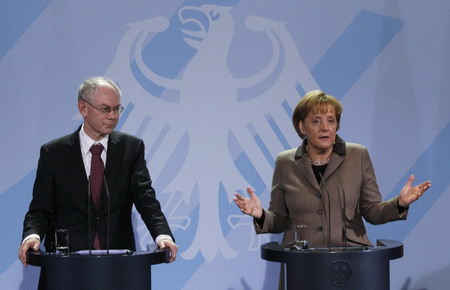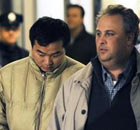Global Biz
German economy down 5%, worst slump since WWII
(Agencies)
Updated: 2010-01-14 10:36
 |
Large Medium Small |
|
 German Chancellor Angela Merkel (R) and European Council President Herman Van Rompuy address a news conference in Berlin, January 13, 2010. [Agencies] |
BERLIN: Germany's economy contracted 5 percent in 2009 amid the global economic downturn, by far its worst performance since World War II, official data showed Wednesday.
The figure published by the German Federal Statistical Office was in line with government predictions but slightly worse than the 4.8 percent contraction widely predicted by analysts.
"What was striking in 2009 is that both exports and capital formation in machinery and equipment slumped heavily," the office said in a statement. "Foreign trade, which in previous years had been a major driving force for growth in the German economy, slowed down economic development in 2009."
The worst postwar performance to date was a 0.9 percent decline in West Germany's gross domestic product in 1975. The worst since German reunification was a 0.8 percent fall in 1993.
"With minus 5 percent, real GDP plunged at the fastest pace ever since World War II," said UniCredit economist Andreas Rees. "One has to go back to the 1930s during the Great Depression to find comparably horrible figures -- In 1932, economic activity was down 4.9 percent; in the previous year, it had even been minus 10.9 percent."
The statistics office did not give fourth quarter figures, saying that not all data had been published, but suggested GDP may have stagnated in the quarter, Rees noted.
"If GDP really treads water at year-end 2009, this would be a very negative surprise," he said. "It is absolutely not backed by upbeat sentiment indicators. Furthermore the so-far released hard data suggest a friendlier picture."
Germany's export-dependent economy technically emerged from a deep recession in the second quarter of 2009, but the country's companies and workers still face slack demand and rising unemployment.
For the full year of 2009, an average of 3.423 million Germans were out of work, an increase of 155,000 as compared with 2008, for a yearly unemployment rate of 8.2 percent.
The government is predicting growth of 1.2 percent in 2010.
Analyst Timo Klein, with IHS Global Insight, was more upbeat but also cautioned that things could change.
"The current German upswing will continue in 2010 but stay modest in scope -- we predict 1.5 percent GDP growth," Klein said. "A risk lingers that there will be a renewed setback around midyear, depending on the strength of the global demand recovery."
The 2009 contraction was the first since 2003, when the economy shrank by 0.2 percent.
The worst period was seen at the end of 2008 and beginning of 2009, with gradual improvement after that, the statistical office said.
In 2008, GDP had risen by 1.3 percent, in 2007 by 2.5 percent and in 2006 by 3.2 percent, the office said.
German Economy Minister Rainer Bruederle said that since the worst of the world financial crisis, the German economy had noticeably recovered.
"The successful recovery of the German economy shows that the worldwide and national measures to support the economy have helped overcome the worst slump in the German economic performance since" the war, Bruederle said in a statement.
"Now it is important to accelerate the growth of the economy and lay the cornerstone for a self-supporting recovery."











